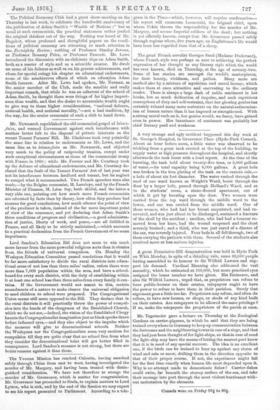Mr. Newmarch republished the old economical gospel of laissez- faire,
and warned Government against, such interference with matters better left to the disposal of private interests as the recent Tenant Farmers' Bill. Mr. Gladstone took very pointedly the same line in relation to endowments as Mr. Lowe, and the same line as to laissez-faire as Mr. Newmarch, and objected -very much to the policy of reciprocity treaties, except under such exceptional circumstances as those of the commercial treaty with France in 1860; while Mr. Forster and Mr. Courtney took up the defence of educational endowments, and Mr. Courtney de- clared that the fault of the Tenant Farmers' Act of last year was not its interference between landlord and tenant, but its neglect to compel what it recommended. Two French speeches were also made,—by the Belgian economist, M. Laveleye, and by the French Minister of Finance, M. Leon Say, both skilful, and the latter a very able one, pointing out how much more French economists are educated by facts than by theory, how often they produce bad reasons for good conclusions, how much oftener the point of view. .a the producer is taken, instead of the far more important point a view of the consumer, and yet declaring that Adam Smith's three conditions of progress and eivilisation,—a good administra- tion of justice, liberty of work, and peace,—are all fulfilled in France, and all likely to be strictly maintained,—which amounts to a practical declaration from the French Government of no mean importance.






























 Previous page
Previous page